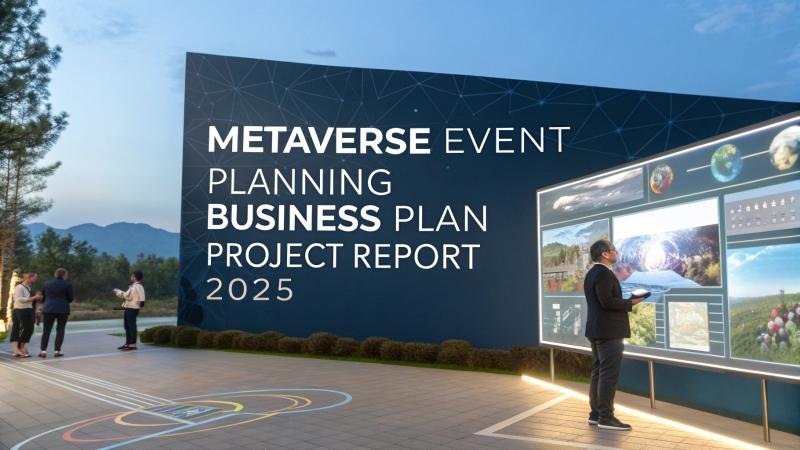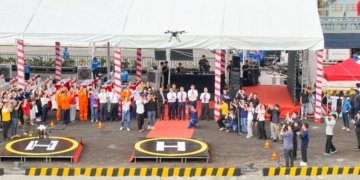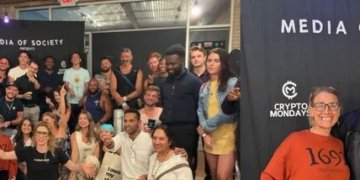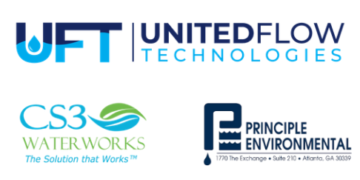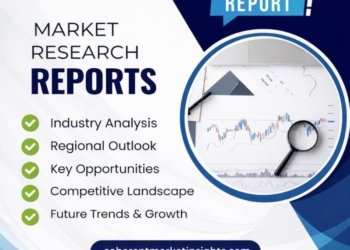Metaverse Event Planning Business Plan & Project Report Overview
IMARC Group’s “Metaverse Event Planning Business Plan and Project Report 2025” offers a comprehensive framework for establishing a successful metaverse event planning business. The critical areas, including market trends, investment opportunities, revenue models, and financial forecasts, are discussed in this in-depth report and are therefore useful resources to entrepreneurs, consultants and investors. Whether evaluating the viability of a new venture or streamlining an existing one, the report gives an in-depth analysis of all the ingredients that make it successful, starting with business formation and profitability over time.
What is a Metaverse Event Planning Business?
A Metaverse Event Planning Business is a specialized digital experience service provider designed to deliver comprehensive, immersive virtual event experiences. These service providers emphasize innovative event creation using virtual reality platforms, augmented reality technologies, 3D virtual environments, interactive avatars, blockchain-based ticketing systems, and digital engagement tools, catering to organizations and individuals seeking cutting-edge, boundary-breaking event solutions in virtual spaces.
They offer a variety of services including virtual conference production, immersive product launches, virtual trade shows and exhibitions, metaverse concerts and performances, digital networking events, NFT-integrated experiences, hybrid event coordination, virtual venue design and customization, and personalized attendee engagement programs for clients committed to innovative and accessible event experiences.
The category encompasses virtual event production agencies, metaverse experience designers, immersive marketing firms, and digital venue operators, each prioritizing 3D environment creation, avatar customization systems, real-time interaction capabilities, cross-platform accessibility, gamification elements, blockchain integration, social engagement features, and comprehensive attendee-centered experience delivery.
To achieve these goals, Metaverse Event Planning Businesses integrate state-of-the-art VR/AR development platforms, 3D modeling and rendering software, virtual event hosting platforms, avatar creation systems, spatial audio technologies, blockchain and NFT integration tools, live streaming infrastructure, analytics and engagement tracking systems, and immersive content creation tools.
Depending on their positioning, these establishments may operate as specialized virtual conference producers, comprehensive metaverse experience agencies, hybrid event coordination firms, or full-service digital event centers, delivering complete immersive event experiences tailored to diverse industries, audience demographics, event scales, and levels of technical sophistication.
Request for a Sample Report: https://www.imarcgroup.com/metaverse-event-planning-business-plan-project-report/requestsample
Metaverse Event Planning Business Market Trends and Growth Drivers
The trends and drivers of a Metaverse Event Planning Business are shaped by the rapid evolution of virtual and augmented reality technologies, growing acceptance of remote and hybrid work models, and the increasing demand for accessible global events without geographical limitations. These factors, combined with a stronger focus on sustainable event practices, cost-effective alternatives to physical venues, and innovative attendee engagement methods, are fueling demand for metaverse event solutions. Contributing to this shift is the expanding interest in immersive brand experiences, gamified interactions, NFT and digital collectibles integration, and blockchain-based ticketing, along with client preference for data-driven attendee insights, customizable virtual environments, unlimited scalability, and memorable interactive experiences within the evolving Web3 and spatial computing ecosystem.
To meet these demands, operators are investing in advanced 3D design capabilities, multi-platform compatibility infrastructure, real-time rendering technologies, interactive engagement tools, and compliance with data privacy and accessibility standards. These investments not only enhance the attendee experience but also strengthen business outcomes by aligning with broader trends in digital transformation and experiential marketing.
Revenue diversification is another critical factor in building financial resilience. In addition to direct event planning and production fees, income streams may include virtual venue rental and licensing, NFT and digital merchandise sales, sponsorship and advertising opportunities, platform subscription services, technical consulting fees, post-event content licensing, and ongoing virtual community management contracts.
Location and digital ecosystem partnerships play a vital role in success. Event planning firms with strong relationships with metaverse platforms, technology providers, VR/AR hardware manufacturers, creative talent networks, and access to target corporate and entertainment clients benefit from steady project pipelines and market credibility. At the same time, cutting-edge technical capabilities, commitment to seamless user experiences, and adherence to accessibility and content moderation standards ensure operational excellence and client trust.
However, the business also faces risk factors, such as rapidly evolving metaverse technologies and platform standards requiring continuous adaptation, intense competition from traditional event planners entering the virtual space and established metaverse platforms offering in-house services, dependence on widespread VR/AR hardware adoption and internet connectivity, and regulatory challenges related to virtual asset ownership, data privacy, and digital content rights.
A successful Metaverse Event Planning Business model requires careful financial planning-including capital investment in 3D design and development software, VR/AR testing equipment and hardware, cloud computing and hosting infrastructure, and adoption of project management and client collaboration platforms. It also demands highly skilled 3D designers, VR/AR developers, experience architects, community managers, and technical support specialists, supported by effective marketing strategies to build brand recognition, foster long-term client relationships, and establish trusted partnerships with corporate clients, entertainment brands, technology platforms, and creative agencies. By delivering immersive virtual environments, seamless technical execution, and exceptional attendee experiences, these businesses can redefine event engagement while enabling clients to reach global audiences in innovative and sustainable ways.
Report Coverage
The Metaverse Event Planning Business Plan and Project Report includes the following areas of focus:
• Business Model & Operations Plan
• Technical Feasibility
• Financial Feasibility
• Market Analysis
• Marketing & Sales Strategy
• Risk Assessment & Mitigation
• Licensing & Certification Requirements
The comprehensive nature of this report ensures that all aspects of the business are covered, from market trends and risk mitigation to regulatory requirements and client-focused acquisition strategies.
Key Elements of Metaverse Event Planning Business Setup
Business Model & Operations Plan
A solid business model is crucial to a successful venture. The report covers:
• Service Overview: A breakdown of virtual venue design and creation, immersive event production, avatar customization services, interactive experience development, live event streaming coordination, NFT integration and digital collectibles, technical support and troubleshooting, and attendee engagement management services offered
• Service Workflow: How each client consultation, concept development, virtual environment creation, platform integration, pre-event testing, live event execution, and post-event analytics delivery process is managed
• Revenue Model: An exploration of the mechanisms driving revenue across multiple service categories and event formats
• SOPs & Service Standards: Guidelines for consistent technical quality, design standards, user experience protocols, and client satisfaction
This section ensures that all operational and creative aspects are clearly defined, making it easier to scale and maintain service quality.
Buy Report Now: https://www.imarcgroup.com/checkout?id=43395&method=1911
Technical Feasibility
Setting up a successful business requires proper digital infrastructure planning. The report includes:
• Location Selection Criteria: Key factors to consider when choosing office locations and target client markets
• Space & Costs: Estimations for required creative studio space, VR testing areas, collaboration zones, and associated costs
• Equipment & Systems: Identifying essential 3D design workstations, VR/AR hardware, rendering servers, and collaboration platforms
• Technology & Creative Setup: Guidelines for creating advanced virtual production capabilities and client-focused delivery systems
• Utility Requirements & Costs: Understanding the high-speed internet, cloud computing resources, and utilities necessary to run metaverse event operations
• Human Resources & Wages: Estimating staffing needs, roles, and compensation for 3D designers, VR developers, experience architects, project managers, technical support staff, and creative personnel
This section provides practical, actionable insights into the technical infrastructure needed for setting up your business, ensuring production excellence and seamless delivery.
Financial Feasibility
The Metaverse Event Planning Business Plan and Project Report provides a detailed analysis of the financial landscape, including:
• Capital Investments & Operating Costs: Breakdown of initial and ongoing investments
• Revenue & Expenditure Projections: Projected income and cost estimates for the first five years
• Profit & Loss Analysis: A clear picture of expected financial outcomes
• Taxation & Depreciation: Understanding tax obligations and equipment depreciation
• ROI, NPV & Sensitivity Analysis: Comprehensive financial evaluations to assess profitability
This in-depth financial analysis supports effective decision-making and helps secure funding, making it an essential tool for evaluating the business’s potential.
Market Insights & Strategy
Market Analysis
A deep dive into the metaverse event planning market, including:
• Industry Trends & Segmentation: Identifying emerging trends and key market segments across virtual conferences and summits, metaverse concerts and entertainment events, virtual trade shows and exhibitions, immersive product launches, and hybrid event experiences
• Regional Demand & Cost Structure: Regional variations in metaverse adoption and cost factors affecting event planning operations
• Competitive Landscape: An analysis of the competitive environment including traditional event agencies expanding into virtual spaces, specialized metaverse experience studios, platform-native event services, and technology-first production companies
Profiles of Key Players
The report provides detailed profiles of leading players in the industry, offering a valuable benchmark for new businesses. It highlights their strategies, service offerings, technology platforms, and market positioning, helping you identify strategic opportunities and areas for differentiation.
Capital & Operational Expenditure Breakdown
The report includes a comprehensive breakdown of both capital and operational costs, helping you plan for financial success. The detailed estimates for infrastructure development, equipment, and operating costs ensure you’re well-prepared for both initial investments and ongoing expenses.
• Capital Expenditure (CapEx): Focused on office and studio space setup and design, high-performance workstations and rendering equipment, VR/AR hardware for testing and development, 3D design and development software licenses, cloud infrastructure initial setup, and collaboration and project management platforms
• Operational Expenditure (OpEx): Covers ongoing costs like creative and technical staff salaries, cloud hosting and computing costs, software subscription and licensing fees, platform access and usage costs, marketing and business development expenses, professional development and training, and facility overhead
Financial projections ensure you’re prepared for cost fluctuations, including adjustments for technology platform updates, talent market competition, hardware refresh cycles, and evolving client demands over time.
Profitability Projections
The report outlines a detailed profitability analysis over the first five years of operations, including projections for:
• Total revenue from event planning and production services, virtual venue licensing, NFT sales, sponsorship coordination, and technical consulting, expenditure breakdown, gross profit, and net profit
• Profit margins for each revenue stream and year of operation
• Revenue per event projections and market penetration growth estimates
These projections offer a clear picture of the expected financial performance and profitability of the business, allowing for better planning and informed decision-making.
Request For Customization: https://www.imarcgroup.com/request?type=report&id=43395&flag=E
Our expertise includes:
• Market Entry and Expansion Strategy
• Feasibility Studies and Business Planning
• Company Incorporation and Digital Service Setup Support
• Regulatory and Licensing Navigation
• Competitive Analysis and Benchmarking
• Industry Partnership Development
• Branding, Marketing, and Client-Focused Engagement Strategy
About Us
IMARC Group is a leading global market research and management consulting firm. We specialize in helping organizations identify opportunities, mitigate risks, and create impactful business strategies.
Contact Us:
IMARC Group
134 N 4th St. Brooklyn, NY 11249, USA
Email: sales@imarcgroup.com
Tel No:(D) +91 120 433 0800
United States: (+1-201971-6302)
This release was published on openPR.
